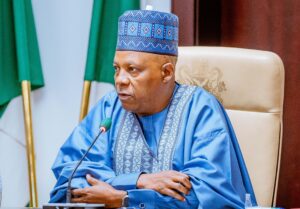WTO, NEPC to tackle export bottlenecks, bureaucracies – Okonjo-Iweala
The Director-General, World Trade Organisation (WTO), Dr Ngozi Okonjo-Iweala says the organisation will work with the Nigeria Export Promotion Council (NEPC) directly to tackle rigid export bureaucracies and other obstacles to scale up production.
Okonjo-Iweala gave this assurance on Wednesday in Abuja at a roundtable on She Trades, Small and Medium Enterprises (SMEs) and export, organised by NEPC and the International Trade Centre (ITC).
Our Correspondent reports that the roundtable was organised to showcase how aid for trade can deliver impacts for livelihoods and economy by fostering gender equality and women empowerment.
The discussion also highlighted trade impacts on jobs in Nigeria, impacts on business environment, Shea sector and on local artisans and communities, creating new frontiers with Information Technology and COVID-19 and business resilience.
According to her, there is a lot to benefit if goods production is scaled up by addressing challenges such as certification, bureaucracy in export, access to credit, policy issues and quality enhancement.
“We can work with NEPC and the Ministry of Industry, Trade and Investments and the entrepreneurs directly, to tackle these challenges facing goods production, packaging and export in the country.
“The WTO will support entrepreneurship investment to trade so that people can trade more, we can add value to our products, improve our services to boost job creation,” she said.
The entrepreneurs showcased different agricultural products ranging from Shea butter, oil from sesame seeds and dates, sugar among others.
The WTO D-G, however, expressed delight in the effort of women entrepreneurs, noting that the range of products she saw was amazing, adding that Nigeria’s product packaging had really improved which gave her hope.
Mr Olusegun Awolowo, Executive Director of NEPC in an address, said it developed Zero Oil Plan, which was promoting an export led development agenda for Nigeria and was engaged in formidable partnerships to achieve its goals.
Awolowo noted that a clear area of focus for the organisation was a drive to gain significant participation of women in non-oil exports, adding that undoubtedly, women’s inclusion in trade could not be overemphasised.
This, he said, would help the country to achieve the United Nations Sustainable Development Goal Number five and Gender Equality, which cut across all sectors.
“We created a Women in Export Division at NEPC, in all the Regional and Export Assistance offices to provide institutional support and advisory services for Women-Owned Businesses (WOBs) to increase participation of women in trade.
“We also redesigned our exporter license form to allow us collect disaggregated data to help us identify WOBs.
“So far, several interventions and programmes have been carried out to build the capacity of women and increase their competitiveness in the global export market,” he said.
Since then, he said the NEPC had organised stakeholders’ engagement in geopolitical zones to bring more women owned businesses into global trade, undertaken surveys and data gathering to understand the unique features of WOBs nation.
The NEPC boss said it also formed clusters for some products with high participation of women down the value chain such as Hibiscus, Textile and Apparel, Sesame seed, Cotton, Moringa and Shea.
These clusters, according to him, were based on better understanding of their requirements to ensure targeted support, while partnerships have been forged to drive financial inclusion.
In recognition of Nigeria’s efforts to drive the She Trades initiative, he said Nigeria was included in the pilot of She Trades in the Commonwealth programme (2018-2021) funded by UK Department for International Development.
“We have made significant progress with implementing our commitments toward She Trades, working with partners and a lot of women owned businesses have benefitted from capacity building programmes and gained market access,” he said.
Awolowo, while congratulating the WTO D-G, said he looks forward to her unfolding agenda for global trade, with anticipation that Nigeria would realise its untapped trade potential through deepening cooperation with other countries in international trade.




